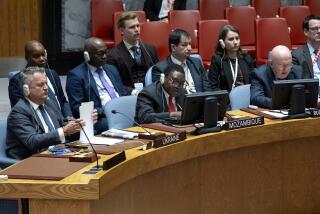A Carrot for Moscow
- Share via
Even as recently as a year ago the suggestion that Moscow might come to be seen as an acceptable site for an international human-rights conference would have been met with derisive laughter. As the capital of a country steeped in despotism and of a regime that has always relied on repression to maintain its power, Moscow seemed to be among the least likely places to confer seriously about universal standards of political and social freedoms. Yet, come 1991, Moscow probably will play host to such a conference, and with the approval of the United States.
That approval, conditionally given this week by both the U.S. and British governments, has evoked a bitter reaction from some Western and Soviet human-rights activists. They charge that both the outgoing Reagan and the incoming Bush Administrations have been taken in by what are largely cosmetic changes in the Soviet Union instituted under the aegis of President Mikhail S. Gorbachev. They further charge that the United States has struck a corrupt bargain primarily to get Soviet agreement to wrap up the 35-nation European security conference in Vienna before President Reagan retires on Jan. 20, thus clearing the way for new East-West talks on cutting conventional forces in Europe.
The critics’ strongest complaint is that the Soviet regime’s fundamental nature--its inherent intolerance of any challenge to its autocratic rule and its readiness to brutally punish dissenters--hasn’t really changed. On that point time could prove the doubters right; it is too soon to make judgments about Gorbachev’s policy of easing repression, and in the light of history it would be folly to conclude that irrevocable changes in Soviet behavior have in fact occurred. But the critics are wrong when they characterize the U.S. decision as naive or, worse, as a “betrayal.”
Conditional U.S. approval of the Moscow conference, as Secretary of State George P. Shultz notes, is not a reward for recently improved Soviet behavior but is part of a process to win expanded freedoms for Soviet citizens. The changes made under Gorbachev to permit greater emigration, release more political prisoners, curb the abuses of psychiatric confinement and end the jamming of Western broadcasts undeniably are impressive. But they impress mainly in the context of traditional Soviet policies. When all is said and done, what is liberalization under the Soviet regime is simply the norm for the world’s more democratic and pluralistic societies. Moreover, there is nothing to prevent an overnight reversal of every change for the better that has so far taken place.
The Soviet Union is still a long way from honoring the commitments that it made in Helsinki in 1975 to respect basic freedoms of speech, religion and travel. The humane changes in its justice system promised by Gorbachev are yet to be codified. But the chance, and certainly the opportunity, for further reforms exists. Conditional Western agreement to take part in a human-rights conference in Moscow is an incentive to the Soviets to continue liberalizing. The United States has made it clear that any regression in Soviet policies would cancel its participation and so sink the conference that Gorbachev is so eager to host. That isn’t being naive, and it’s not a betrayal. See it rather as a way of exerting shrewd political leverage in behalf of decent and vital principles.
More to Read
Sign up for Essential California
The most important California stories and recommendations in your inbox every morning.
You may occasionally receive promotional content from the Los Angeles Times.













